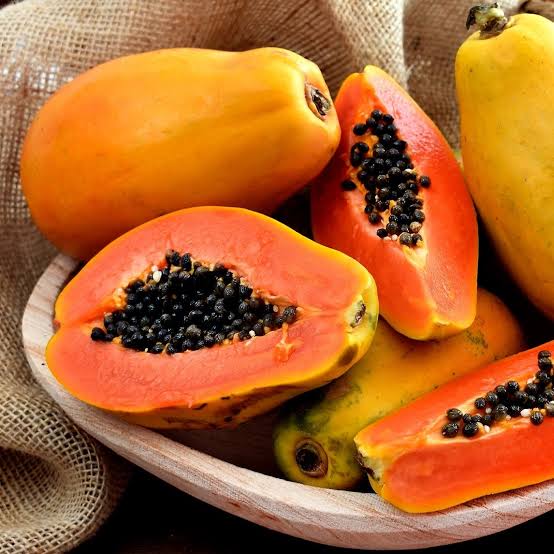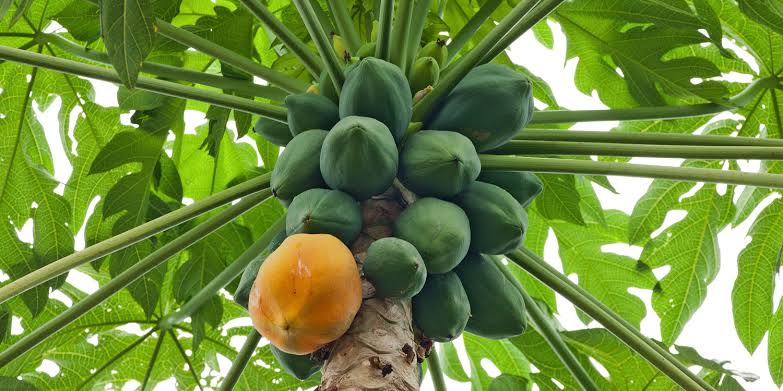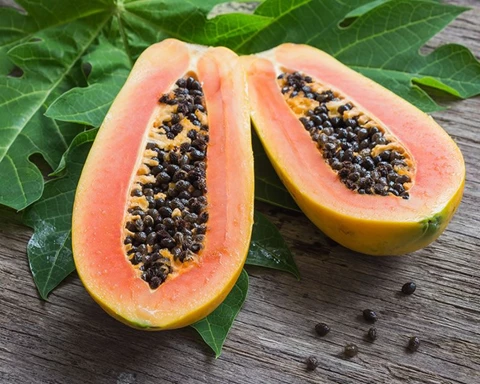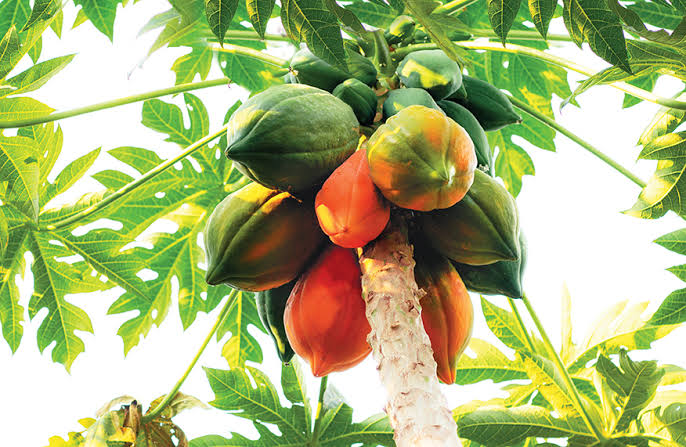Pawpaw fruit, scientifically known as Carica papaya, is a tropical delight that has gained popularity worldwide for its unique flavor, vibrant color, and numerous health benefits. Native to Central America and the Caribbean, this fruit is now cultivated in many tropical and subtropical regions across the globe, including parts of Africa, Asia, and the southern United States.
Its distinctive sweet taste and buttery texture make it a favorite in fruit salads, smoothies, and desserts, while its rich nutritional profile contributes to its appeal as a health food. The pawpaw tree is a fast-growing plant that can reach heights of up to 30 feet. It has large, palm-like leaves that can measure up to three feet across.
The fruit itself is typically pear-shaped, ranging in size from 6 to 20 inches long. When ripe, the skin of the pawpaw changes from green to a beautiful golden yellow or orange hue.
The flesh inside is soft and juicy, with a sweet flavor reminiscent of a blend between mango, banana, and melon. Each pawpaw contains numerous black seeds that can be eaten, although they are often discarded due to their bitter taste.
The nutritional value of pawpaw fruit is impressive, as it is low in calories and packed with essential vitamins and minerals. It is an excellent source of vitamin C, which plays a vital role in boosting the immune system and promoting healthy skin.
Additionally, pawpaw contains significant amounts of vitamin A, which is important for maintaining good vision and overall eye health. Other notable nutrients include vitamin E, folate, potassium, and magnesium. The fruit is also rich in dietary fiber, which aids digestion and helps prevent constipation.
One of the standout features of pawpaw fruit is its enzymatic content, particularly papain. This enzyme is known for its ability to break down proteins and is often used as a natural meat tenderizer. Papain also has potential digestive benefits, making pawpaw a popular choice for those seeking to improve their digestive health.
The fruit’s natural enzymes can help alleviate symptoms of indigestion and bloating, contributing to overall gut wellness. The health benefits of pawpaw fruit extend beyond its nutritional content.
Research suggests that the fruit possesses anti-inflammatory and antioxidant properties, which may help combat oxidative stress and reduce the risk of chronic diseases. These properties make pawpaw a valuable addition to a balanced diet, promoting overall health and well-being.
Pawpaw fruit is often recommended for pregnant women due to its nutritional benefits. It provides essential vitamins and minerals that support fetal development and maternal health.
However, it is important to note that unripe pawpaw fruit should be avoided during pregnancy, as it contains compounds that may stimulate contractions. Ripe pawpaw fruit, on the other hand, is safe and beneficial, providing nourishment to both the mother and the developing baby.
In many cultures, pawpaw fruit is used in traditional medicine for various ailments. Its leaves and seeds have been employed in herbal remedies for digestive issues, skin conditions, and inflammation.
Pawpaw leaf extract has gained popularity as a natural remedy for boosting platelet counts in individuals with certain health conditions, including dengue fever. In culinary applications, pawpaw fruit is incredibly versatile.
It can be consumed fresh, added to smoothies, used in baking, or made into jams and jellies. Its natural sweetness makes it an excellent ingredient for desserts, while its creamy texture lends itself well to various dishes.
Pawpaw fruit can also be paired with savory ingredients, such as lime, chili, and herbs, to create unique and flavorful salads and salsas. When selecting pawpaw fruit, look for fruit that is slightly soft to the touch and has vibrant skin.
A ripe pawpaw fruit will yield slightly when pressed and emit a sweet fragrance. It is best enjoyed fresh, but if you have an abundance, you can store it in the refrigerator for a few days or freeze it for later use. Despite its many benefits, pawpaw fruit is not without its challenges.
It is highly perishable and can bruise easily, which makes it difficult to transport and store. This is why pawpaw fruit is often found in local markets rather than in supermarkets, as it does not have a long shelf life. However, its unique flavor and health benefits make it worth seeking out.
Benefits of Pawpaw Fruit

One of the most noteworthy aspects of pawpaw is its nutritional profile. The fruit is rich in vitamins A, C, and E, which play crucial roles in supporting the immune system, maintaining healthy skin, and promoting overall vitality. Vitamin C, in particular, is an antioxidant that helps protect the body against oxidative stress, boosts collagen production, and supports wound healing.
The presence of vitamin A in pawpaw contributes to good vision and skin health, while vitamin E is known for its ability to combat free radicals, thereby promoting healthy aging. For pregnant women, the benefits of eating pawpaw fruit during pregnancy are especially significant.
It provides essential nutrients that support fetal development and maternal health. With its high vitamin content, pawpaw can help alleviate some common pregnancy-related issues. The fiber found in pawpaw promotes healthy digestion and can prevent constipation, a frequent complaint among expectant mothers.
The fruit’s natural sweetness also makes it a satisfying and nutritious snack option. Furthermore, the benefits of pawpaw fruit in pregnancy extend beyond basic nutrition. It contains folate, which is vital for DNA synthesis and cellular division, making it essential for fetal growth and development.
Adequate folate intake during pregnancy can help prevent neural tube defects and promote healthy brain development in the fetus. In addition to its advantages for pregnant women, pawpaw fruit also holds promise for those dealing with digestive issues, particularly ulcers.
The benefits of unripe pawpaw fruit for ulcer treatment are increasingly recognized. Unripe pawpaw fruit contains enzymes, particularly papain, which aids in breaking down proteins and promoting digestion.
This can help reduce discomfort and irritation in the digestive tract, making unripe pawpaw fruit a potential natural remedy for those suffering from ulcers. Research has shown that pawpaw fruit possesses anti-inflammatory properties, which can be beneficial for individuals with ulcers. Inflammation is a common issue in ulcer patients, and reducing it can help alleviate symptoms.
The nutrients found in unripe pawpaw fruit, including antioxidants, can support the healing process and contribute to overall gut health. Many people inquire about the specific benefits of unripe pawpaw fruit for ulcers, and the fruit’s natural compounds can help soothe the stomach lining, promoting recovery and reducing pain.
For those wondering about the benefits of pawpaw during pregnancy, it is important to note that while ripe pawpaw fruit is generally safe for expectant mothers, unripe pawpaw should be avoided. Unripe pawpaw fruit contains latex, which can stimulate uterine contractions and may pose a risk during pregnancy.
Therefore, it is essential to enjoy pawpaw fruit only when it is fully ripe to reap its health benefits without potential risks. Incorporating pawpaw fruit into daily meals is simple and versatile.
It can be eaten fresh, blended into smoothies, or added to salads for a burst of flavor and nutrition. Its natural sweetness makes it an excellent addition to desserts, while its creamy texture lends itself well to various dishes.
For expectant mothers looking to increase their fruit intake, pawpaw can serve as a delicious and nutritious option that aligns with their dietary needs. Moreover, pawpaw fruit is not only beneficial for pregnant women and those suffering from ulcers but also offers a range of advantages for individuals of all ages.
It is low in calories and rich in dietary fiber, making it an excellent choice for those seeking to maintain a healthy weight. Its high fiber content aids digestion and promotes a feeling of fullness, helping to curb overeating.
The antioxidant properties of pawpaw also contribute to its overall health benefits. Regular consumption of this fruit can support heart health by reducing cholesterol levels and improving circulation.
The potassium content in pawpaw helps regulate blood pressure, while the presence of dietary fiber aids in maintaining healthy cholesterol levels, reducing the risk of cardiovascular diseases.
In addition to its physical health benefits, pawpaw fruit can also support mental well-being. It is rich in vitamin B, which plays a key role in maintaining a healthy nervous system. Consuming pawpaw may contribute to improved mood and cognitive function, making it a beneficial addition to a balanced diet.
Read Also: 12 Medicinal Health Benefits of Aloe buettneri (Mountain aloe)
Health Benefits of Pawpaw Fruit

1. Rich Nutritional Profile: Pawpaw is rich in:
- Vitamin C: An antioxidant that protects the body from oxidative stress and boosts the immune system.
- Vitamin A: Supports eye health and promotes skin vitality.
- Vitamins B and E: Essential for energy production and skin health.
- Minerals: Contains potassium and magnesium that are crucial for overall health.
2. Aids Digestion: One of the remarkable features of pawpaw is its potential to aid digestion. The fruit contains a natural enzyme called papain, which is known for its ability to break down proteins and support digestive health.
This enzyme is particularly useful for individuals experiencing digestive discomfort or bloating. Incorporating pawpaw into one’s diet can help alleviate these issues, making it a popular choice for promoting gut health.
3. Supports Ulcer Treatment: For those dealing with digestive disorders, especially ulcers, unripe pawpaw fruit has emerged as a valuable natural remedy. Many people inquire about how to cure ulcers with unripe pawpaw.
The green variant of the fruit contains higher levels of beneficial enzymes and compounds that can soothe the digestive tract and promote healing due to its anti-inflammatory properties. To effectively utilize unripe pawpaw for ulcer treatment, proper preparation is essential. Below are steps on how to prepare pawpaw for ulcer treatment:
- Peel the unripe pawpaw and remove the seeds.
- Cut it into small pieces and blend it to create a smooth paste.
- This paste can be consumed as a daily supplement to aid in the healing of ulcers.
4. Pawpaw Seeds for Ulcers: Pawpaw seeds are another component that can contribute to ulcer treatment. While often discarded, these seeds possess health benefits that should not be overlooked. Pawpaw seeds contain various nutrients and have been used traditionally for their medicinal properties.
Some studies suggest that pawpaw seeds for ulcers may help combat harmful bacteria in the gut, thereby supporting overall digestive health. Incorporating crushed pawpaw seeds into smoothies or salads can provide an additional layer of benefits for those dealing with digestive issues, including ulcers.
5. Benefits for Pregnant Women: Pawpaw is particularly advantageous for pregnant women. The health benefits of pawpaw in pregnancy are significant, as the fruit is rich in essential nutrients that support both maternal health and fetal development. Vitamin C and folate in pawpaw play vital roles in boosting the immune system and supporting the growth of healthy cells.
The fiber content in pawpaw also helps alleviate constipation, a common issue among expectant mothers. The consumption of pawpaw during pregnancy is beneficial due to its ability to provide essential vitamins and minerals that contribute to the overall health of both the mother and the developing baby.
However, it is crucial to consume ripe pawpaw only, as unripe pawpaw contains latex, which can potentially stimulate uterine contractions and pose risks during pregnancy. Ripe pawpaw, on the other hand, is safe and nutritious, offering a sweet and satisfying option for pregnant women.
6. Culinary Versatility: Incorporating pawpaw into daily meals is simple and versatile. The fruit can be enjoyed fresh, blended into smoothies, or added to salads for a burst of flavor and nutrition. Its natural sweetness makes it an excellent addition to desserts, while its creamy texture lends itself well to various dishes.
7. Low in Calories: Moreover, pawpaw is low in calories, making it an excellent choice for those seeking to maintain a healthy weight. Its high fiber content promotes satiety, helping to curb overeating. Incorporating pawpaw into a balanced diet can support weight management while providing essential nutrients.
8. Rich in Antioxidants: The antioxidant properties of pawpaw contribute to its overall health benefits. Regular consumption of this fruit can help reduce inflammation throughout the body, lowering the risk of chronic diseases. The phytonutrients present in pawpaw can combat oxidative stress and improve overall well-being.
9. Mental Health Benefits: Additionally, pawpaw can support mental well-being. The fruit is rich in vitamin B, which plays a key role in maintaining a healthy nervous system. Consuming pawpaw may contribute to improved mood and cognitive function, making it a beneficial addition to a balanced diet.
Read Also: List Of Hydroponic Vegetables
Frequently Asked Questions on Health Benefits of Pawpaw Fruit

1. Is pawpaw good for ulcer?
Yes, pawpaw is beneficial for individuals with ulcers. The fruit, particularly when unripe, contains enzymes and anti-inflammatory properties that can help soothe the digestive tract and promote healing. Its natural composition aids in reducing irritation in the stomach lining, making it a useful dietary addition for those suffering from ulcers.
2. Is pawpaw good for ulcer patients?
Absolutely, pawpaw is good for ulcer patients. Its nutrient-rich profile and enzymes like papain contribute to better digestion and help alleviate symptoms associated with ulcers. Consuming pawpaw can support overall digestive health and provide relief from discomfort caused by ulcers.
3. Can unripe pawpaw cure ulcer?
Unripe pawpaw has shown potential in helping to cure ulcers. The green variant of the fruit contains higher concentrations of beneficial enzymes and compounds that may aid in the healing process. By incorporating unripe pawpaw into the diet, individuals can leverage its natural properties to combat ulcer symptoms.
4. What are the health benefits of pawpaw during pregnancy?
Pawpaw offers numerous health benefits for pregnant women, including high levels of vitamins A and C, which are essential for both maternal health and fetal development. The fruit also provides dietary fiber, which can help alleviate constipation, a common issue among pregnant women, and it supports the immune system.
5. How should unripe pawpaw be prepared for ulcer treatment?
To prepare unripe pawpaw for ulcer treatment, you can peel and slice the fruit, then blend it into a paste. This paste can be consumed daily to harness its healing properties. Alternatively, you can soak slices of unripe pawpaw in water overnight to create a soothing infusion.
6. What are the benefits of eating ripe pawpaw?
Ripe pawpaw is not only delicious but also packed with nutrients. It is rich in antioxidants, vitamins, and minerals that support overall health. The fruit aids in digestion, boosts the immune system, and promotes healthy skin due to its high vitamin C content.
7. Can pawpaw seeds be used for ulcers?
Pawpaw seeds are often overlooked but can be beneficial for digestive health. They contain compounds that may help combat harmful bacteria in the gut, thus supporting overall digestive health, including for those dealing with ulcers. Incorporating crushed pawpaw seeds into your diet can enhance your nutritional intake.
8. Are there any risks associated with eating unripe pawpaw?
While unripe pawpaw has its benefits, it should be consumed with caution, especially by pregnant women. Unripe pawpaw contains latex, which can stimulate uterine contractions and may pose risks during pregnancy. It is essential to ensure that only ripe pawpaw is consumed during pregnancy and to consult a healthcare provider if you have any concerns.
Read Also: 10 Health Benefits of Lemon Grass (Cymbopogon)
Do you have any questions, suggestions, or contributions? If so, please feel free to use the comment box below to share your thoughts. We also encourage you to kindly share this information with others who might benefit from it. Since we can’t reach everyone at once, we truly appreciate your help in spreading the word. Thank you so much for your support and for sharing!

